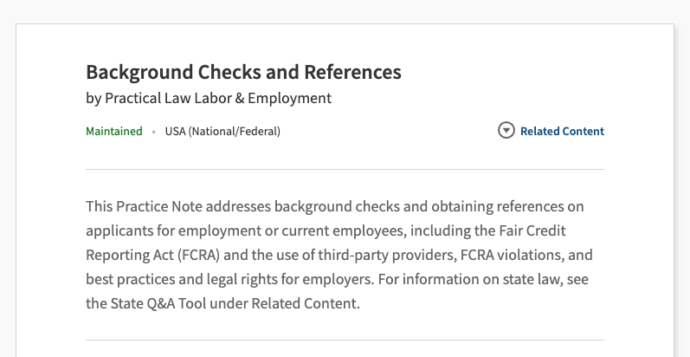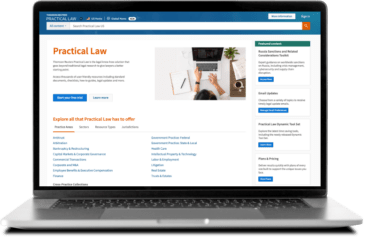Employment background checks reveal job candidates’ personal records, allowing employers to make educated hiring decisions in compliance with employment regulations
Background checks are an integral part of the employee hiring and onboarding process. An estimated 95% of U.S. businesses run background checks before making hiring decisions. Though not generally required by federal law, engaging in this vetting process is highly advisable.
Screening potential candidates generally reveals information available in public records, such as education, employment, and credit history. Companies also pay attention to other information, like a candidate’s social media footprint.
These important reviews allow employers to evaluate an individual’s credentials, minimize the risk of employee fraud or theft, and limit litigation exposure. If done correctly, background checks help protect employers from legal, financial, and reputational harm.
Below you will find information about how background checks help employers make educated hiring decisions.
Jump to ↓
| Top 5 advantages |
| What types of records show up in the employment background check? |
| How do you run an employee background check? |
| Are background checks and one-and-done process? |
Top 5 advantages of conducting background checks
Background checks benefit employers in myriad ways. The information they provide can help employers hire the right candidates, thereby reducing employee turnover, enhancing corporate culture, increasing corporate profits, and contributing to overall company success. The top advantages are:
- Evaluate the accuracy of an applicant or employee’s credentials. Inaccurate application information leads to the hiring of unqualified individuals.
- Minimize the risk of employee theft and other crimes, such as fraud. This is particularly important when hiring for positions in the financial sector.
- Minimize the risk of workplace violence. Investigating a candidate’s background helps filter out applicants who may engage in threatening, abusive, violent or disruptive behavior toward employees, clients, and visitors.
- Reduce exposure to litigation. If an employee with a violent history harms a customer, the customer may file a negligent hire lawsuit, arguing the employer should have known the risk that individual posed.
- Reduce the risk of noncompliance with immigration laws. Immigration violations, whether knowing or unknowing, have serious financial and legal ramifications.
Employees who lie about their job qualifications and work experience are unlikely to excel in their new positions. Additionally, dishonest applicants can increase a company’s legal and financial exposure. These risks reinforce the importance of thoroughly checking each candidate’s background.
 |
What types of records show up in the employment background check?
The records employers choose to review depends on the type of employment at issue. Background screenings often include information gathered from sources such as:
- Identity records. A simple identity search will ensure an applicant is who they say they are.
- Employment records. Not all applicants are honest about their previous employment. As many hiring decisions hinge on previous experience, it is crucial to verify employment claims. Determining why applicants left their previous jobs is also relevant.
- Employment references. Previous employers are often best equipped to elucidate an applicant’s professional strengths and weaknesses. But remember, applicants don’t typically list references who will report negative information.
- Educational history, licensing and certification records. These easily verifiable items can help confirm a candidate’s credentials.
- Medical records. The search report will not provide substantive medical information unless it is relevant to a particular job. Specific written consent for the release of this private information is required.
- Drug testing. Drug tests are conducted to ensure a drug free work environment, reduce the risk of work-related accidents and decrease the likelihood for addiction-based theft or fraud.
- Bankruptcy and civil court records. These reports can reveal an applicant’s financial proficiency, but employers must be mindful of how the information is utilized. Poor credit reports can be the result of medical bills, student loans or other innocuous expenses. Bankruptcy filings cannot adversely affect a candidate’s hiring odds.
- Credit history. The information contained in these reports is particularly relevant to an applicant who will be handling money regularly. Notably, several states and certain cities prohibit employers from using a credit check in making employment decisions.
- Immigration Records. Employers who hire individuals who are not authorized to work in the US could face stiff penalties.
- Driving records. A record of impaired driving may be relevant to an individual applying to operate a commercial truck.
Recently, employers have begun paying more attention to the applicant’s digital footprint.
Review the applicant’s digital footprint
We all leave a trail of digital breadcrumbs while conducting our daily lives. By sifting through these digital insights, employers get to know job candidates better and learn about how they may enhance company culture. An applicant’s digital footprint can also be their downfall. For example, social media posts about previous employment can expose application inaccuracies.
It’s tempting to enter a candidate’s name into a search engine and follow the rabbit hole wherever it may lead. This is the wrong approach. Digital searches must comply with all federal, state and local regulations. As with all steps in the hiring process, companies should have a digital background check policy. Delving into an applicant’s social media presence can create privacy concerns, and not all online information is accurate. As with all general background screenings, it is best to have a third-party search firm do the online digging.
What do standard background checks not reveal?
General background checks will not show military records, expunged convictions or minor infractions, sealed records, or juvenile records.
- Criminal Records. Most employers should not consider criminal records when making hiring decisions. However, an employer can consider if the conduct makes the individual unfit to hold a certain position. Be mindful, criminal history inquiries pose a risk of creating disparate treatment discrimination.
- Military records. Military records must be specifically requested. They are a standard background check inquiry.
How do you run an employee background check?
The gold standard for conducting background checks is to enlist the help of an experienced third-party search firm. The search firm does all the work, and you receive a background report about the job candidate. These firms are best equipped to address the complexities of the process and to understand the laws governing these reviews. Should you decide to run the background investigation in-house, these guidelines may help your hiring managers and HR staff.
Whether the background check is contracted out or performed in-house, the regulations set forth by The U.S. Equal Employment Opportunity Commission (EEOC) and the Federal Trade Commission (FTC) must be followed.
EEOC compliance
Background checks can only be ordered for legitimate hiring reasons. Per EEOC guidelines, an applicant’s race, national origin, skin color, sex, religion, disability, genetic information, and age (40 or older) may not form the basis for ordering a background check.
FTC compliance
In accordance with the Fair Credit Reporting Act (FCRA):
- Prospective employees must receive written notice that information collected by a third-party agency during a background check may influence hiring decisions. The applicant must approve of the background check in writing.
- When an “investigative report” is ordered, applicants have a right to receive an explanation of the “nature and scope” of the investigation.
- The employer must certify to the third-party agency that it has complied with the disclosure requirements, will comply with the adverse requirements, if applicable, and will not use the information provided by the agency to violate equal employment requirements.
Adherence to these regulations is crucial and reduces the likelihood of future discriminatory hiring claims.
How long do background checks take?
It does not take long for a third-party screening firm to generate a wealth of applicant background knowledge. Steps such as identity verification take as little as 90 seconds. Educational and employment verifications take a bit longer, but typically no more than a few days. The biggest delays arise when criminal background checks or military inquiries are ordered. Delays can also occur when screening request forms contain incomplete or inaccurate information or failure to get the job applicant’s written authorization for the requested search.
Employers should be prepared to wait longer for the completion of more extensive searches. The exact turnaround time will vary slightly depending on the screening firm you hire, but most conclude their searches within a week.
Are background checks and one-and-done process?
Background checks are not reserved for new applicants alone. Existing employees can also be the subject of these inquiries. People’s circumstances change and it is important for companies to stay informed. Just like during the new hire process, written permission is required before conducting periodic background checks.
Protect your company from legal, financial, and reputational risks
A proper employee background check, completed either in-house or by an outside search firm, reveals important information before hiring decisions are made. Faulty or incomplete background checks can have serious ramifications, such as the hiring of an unqualified candidate. More importantly, failing to perform your due diligence can also expose your company to negligent hiring claims, financial exposure, and reputational harm.
Background checks must always be performed in compliance with EEOC and FTC guidelines, as well as state and local regulations. Access the Practical Law Checklist discussing considerations for private employers when using background checks, including compliance with the federal FCRA requirements. Get free access to Practical Law today!











